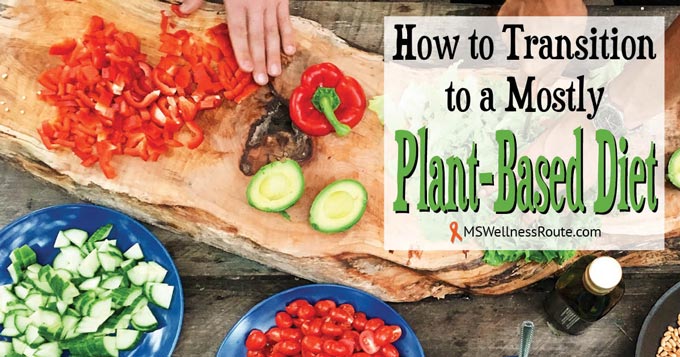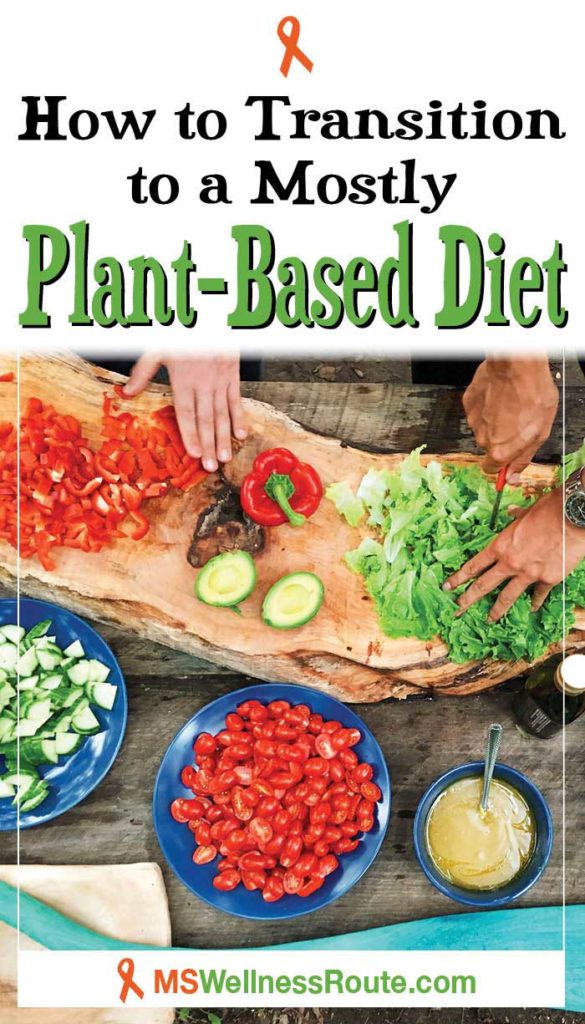Last Updated on December 5, 2023 by Cathy

Have you considered using food as your medicine? There are many diets for multiple sclerosis (MS) and the main focus is a nutrient-dense diet. A plant-based diet is full of nutrients that will help your body heal.
If you are anything like me, it’s not the diet, it’s the fear of another MS attack that’s making you change your eating habits. It was right after I had the worst MS attack I’d ever had that I decided to change my diet. That was one week before Thanksgiving. I was so depressed watching everyone enjoy their traditional meal. While I ate a boring iceberg lettuce salad.
It doesn’t have to be like that. Today, I eat mostly vegetables. It’s so delicious even if I did not have to worry about my health I would still want to eat this way. You can get a guide for fruits and vegetables at the bottom of this post.
Research on MS
Gone are the days of using arsenic or strychnine (a highly toxic poison) as a treatment for MS. Although some of today’s treatments are just as toxic as those from the early 1900s. Causing side effects from flu-like symptoms to death. The interesting part about early research. Even from the 1930s, they were looking into how food played a role. Cutting out man-made foods and eating a mostly plant-based diet was working back then too.
Today, there are hundreds of studies looking into how diet affects people with MS. Each study holds new hope for the next best drug. But why are they always looking into drug therapy when eating a healthy diet is just as promising?
Fortunately, researchers are getting closer than ever as to why people get MS. They believe most people are born with a genetic predisposition. They also believe it’s the environment that triggers the disease. By changing your diet and lifestyle, you can stop the progression of MS.
Triggers to MS:
- Poor Diet
- Infections (bacteria, parasites, viruses, and yeast overgrowth)
- Environmental toxins (heavy metals, mold, pesticides, etc.)
- Chronic stress
- Hormones (adrenaline, cortisol, etc.)
Why eat a mostly plant-based diet?
Most health experts recommend a diet that focuses mostly on plants. It is an easy way to achieve the most nutrients. There are many recent studies supporting the benefits of a plant-based diet. Including heart disease, cancer, and chronic diseases like MS.
According to the National Center for Biotechnology Information (NCBI), people have a lower risk for:
- Cancer
- Coronary artery disease
- Lower cholesterol
- Most chronic diseases
- Obesity
- Type 2 diabetes
Things you avoid by eating mostly plants:
- Antibiotics. 70-80% of antibiotics used in the U.S. are for healthy livestock to avoid infections. Due to their poor living conditions. If you are consuming conventional meat. You are consuming antibiotics that destroy your gut bacteria.
- Carcinogens. When cooking meat, especially on high heat, it forms certain compounds. These compounds are carcinogenic and pro-inflammatory which contribute to chronic diseases.
- Growth hormones. Livestock receive insulin-like growth hormones to stimulate their bodies to grow faster. Insulin-like growth hormones also promote cancer proliferation.
- N-glycolylneuraminic acid is a compound found in meat that promotes chronic inflammation.
Eating mostly plant-based foods is not only more nutrient-dense. It adds more antioxidants, anti-inflammation, and fiber. It also helps you save money from buying more expensive meats.
Tips for Eating A Plant-Based Diet
If you currently eat a lot of meat at each meal start by reducing your meat intake each day. Or you could try having no meat day once a week and call it “Meatless Whateverday” like Meatless Monday. Once you and your family get used to it, increase it to another day. If you find yourself getting hungry between meals increase your good-quality fats. like avocados, nuts, full-fat coconut milk, coconut oil, and starchy vegetables.
Work your way to only eating meat a few times each week. Or a very small amount each day. Pay attention to your protein intake. Protein plays an important role in building and repairing tissues. It helps fight infections and recover from illnesses quickly.
Good sources of protein:
- Acai berries
- Avocados
- Broccoli
- Dark leafy greens
- Nuts and seeds
- Spirulina
Vitamins
Vitamin B12 is a nutrient you can’t get adequately through a plant-based diet. Vitamin B12 is synthesized through algae, bacteria, fungi, and microorganisms, not from plants. A vitamin B12 deficiency can lead to neurological damage. You can find some vitamin B12 in food sources. Such as fermented foods, mushrooms, sea vegetables, and spirulina. But it is not enough to stay healthy.
This is the vitamin B supplement I use: Liquid B12
Vitamin D3 also known as the sunshine vitamin because it comes from the sun, it is actually a hormone. It is a known fact that a vitamin D deficiency is a trigger to the onset of MS. It’s important to get tested and keep your levels between 60-80 ng/mL.
Most insurance should pay for both of these tests. But if they don’t you can also use an online lab and then visit a local office for the blood work. I’ve used this route for different tests, it’s inexpensive, quick, and convenient.
Important information in this post:
• DNA Test for Multiple Sclerosis
• Does Spirulina Benefit MS?
• Multiple Sclerosis and Vitamin D
Buying Meat
When you do purchase meat, make sure from a high-quality source. Avoid conventional meats that are full of antibiotics, growth hormones, and grains (they are fed GMO grains and soy to fatten up).
The Food and Drug Administration (FDA) recommends women who are pregnant avoid certain fish and shellfish due to their higher levels of mercury. Mercury can harm an unborn baby or a young child’s developing nervous system. Since we are trying to heal our central nervous system, it’s best to avoid these fish and shellfish too. Avoid shark, swordfish, king mackerel, tilefish, and some tuna.
Pork is very popular worldwide, there are even “bacon parties” for the best bacon recipe. But, pigs are scavengers, they literally eat trash and dead carcasses! These toxins are in their entire system. So when you eat pork, you are eating toxins. There was a study that showed “A significant correlation was obtained between the prevalence of multiple sclerosis and… pork consumption.”*
High-quality meats:
- Bison
- Game meat
- Grass-fed beef
- Lamb
- Pasture-raised poultry
- Wild-caught fish
Let Food be thy medicine
You are trying to heal the damage to your central nervous system caused by MS. So it is extremely important to eat a HUGE variety of vegetables every single day. Do not get caught up in only eating a few different vegetables all the time. By doing so, you will become deficient in certain vitamins and hurt your body more.
Let food be thy medicine and medicine be thy food.
– Hippocrates
Don’t get frustrated, instead get creative by using different herbs and spices to flavor your meals. Eat a rainbow of fruits and vegetables every day! The deeper the color, the more antioxidants. Include fermented vegetables every day and every meal if possible. I have an easy recipe for sauerkraut or you can buy some at your local health food store.
Eating more vegetables is a powerful tool to help your body heal. Also, remove as many environmental toxins as possible. This is will help ease the toxic overload that is currently on your body.
Get Your Guide to Fruits and Vegetables:
Get the password for the library including my Guide to Fruits and Vegetables here by filling out this form:
Want to remember this pin? Pin it to your favorite Pinterest board!

Resources:
Multiple sclerosis, latitude and dietary fat: is pork the missing link?
How to Transition to a Mostly Plant-Based Diet





